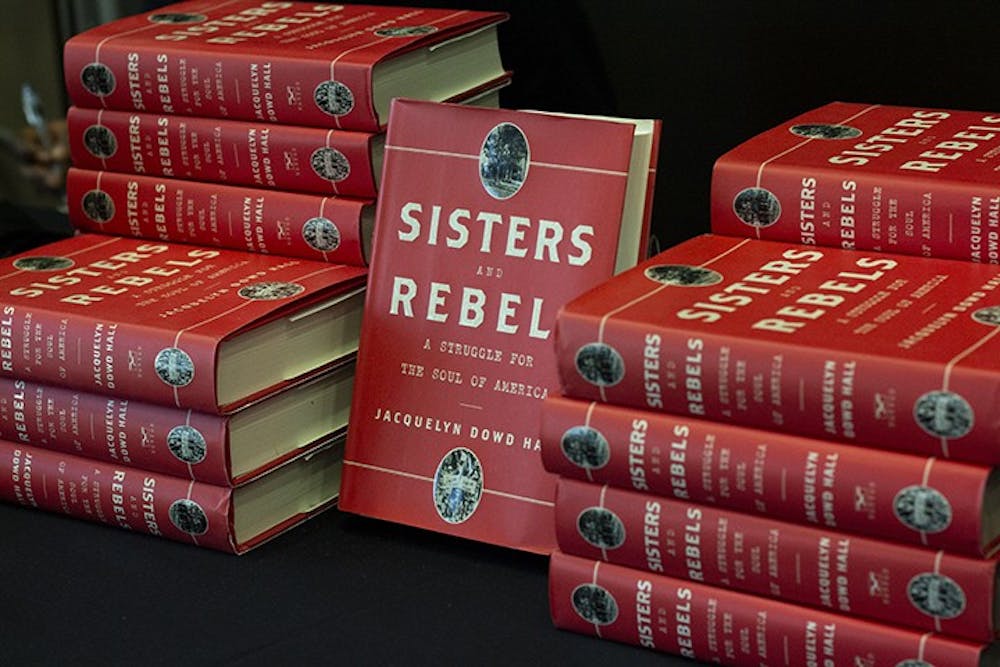A UNC Chapel Hill professor spoke about her new book, "Sisters and Rebels: A Struggle for the Soul of America" in the Hollings Special Collections Library Thursday. The event was hosted by the university and the University South Caroliniana Society, a private nonprofit organization which supports the Caroliniana Library.
Jacquelyn Hall, a professor emerita at UNC Chapel Hill and a National Humanities Medal-winning author, said her involvement in the civil rights movement in the 1960s provided the inspiration for her book, which details the story of three Lumpkin sisters who grew up in the South and took very different paths.
Hall first learned of the Lumpkins in graduate school from the autobiography "The Making of the Southerner." When she led the UNC Southern Oral History Program, the first projects involved interviewing women of the 20th century. In 1974, she traveled to Virginia to interview them and kept in touch.
“They interested me 50 years ago, and I kept thinking about them and eventually wanted to see if I could weave together their stories along with that of their older sister and see what kind of perspective on the century of history that they lived through,“ Hall said.
Hall's biggest challenge was finding sources and finding the information she needed to write the Lumpkins' story.
“Because of what they lived through and the scars that they carried, there were a lot of things they didn’t want to talk about," Hall said. "There were a lot of things that were not in their papers, either because they had been destroyed or had never been kept in the first place.”
Henry Fulmer, director of the South Caroliniana Library, said Hall's lecture and her association with the library as a researcher since the 1970s were very important.
“This public event has allowed members of the South Caroliniana staff who have worked closely with Dr. Hall over the years to help share her story of the Lumpkin sisters,” Fulmer said in an email interview.
Hall’s lecture is the first annual fall event the University South Caroliniana Society has hosted. Fulmer ultimately believes supporting and hosting educational events surrounding researchers studying the history of South Carolinians like Hall, going beyond just the use and publication of their research, fits with the society’s purpose.
“The constitution of the University South Caroliniana Society states that its purpose is ‘to promote a better understanding and appreciation of South Carolina, its history and culture,'" Fulmer said.
Jennifer Dixon-McKnight, a history professor at Winthrop University who specializes in African American working class women, had Hall as her dissertation adviser. Her project focused on the 1969 hospital strike in Charleston. She discussed the questions that arose based on Hall’s depiction of the tradition of South Carolina women and the ways they have been active in the communities in which they live.
“What role does race and class play in that, and is there a line in those various movements that is drawn across racial lines or cross-class lines?” Dixon-McKnight said.
Dixon-McKnight said Hall’s book influenced her own views and the direction of her own research.
“Dr. Hall's book is causing me to rethink not just how the women that I’m looking at fit into the broader history of civil rights movement, but also how the women that I’m looking at fit into a larger history of South Carolina women’s activism,” Dixon-McKnight said.
Laura Woliver, a retired political science and women’s studies professor who specialized in women in politics at USC, came to the event to see Hall speak.
“It’s more than half of our history, and it helps us understand our world," Woliver said. "It helps us understand the politics of today and the phenomena of the violence against women, the disproportionate underrepresentation of women."
Note: This article has been edited to accurately reflect the relationship between Hall and the South Caroliniana Library.

